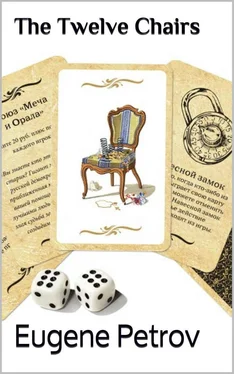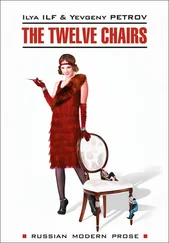Eugene Petrov - The Twelve Chairs
Здесь есть возможность читать онлайн «Eugene Petrov - The Twelve Chairs» весь текст электронной книги совершенно бесплатно (целиком полную версию без сокращений). В некоторых случаях можно слушать аудио, скачать через торрент в формате fb2 и присутствует краткое содержание. Год выпуска: 2013, Жанр: Юмористическая проза, на английском языке. Описание произведения, (предисловие) а так же отзывы посетителей доступны на портале библиотеки ЛибКат.
- Название:The Twelve Chairs
- Автор:
- Жанр:
- Год:2013
- ISBN:нет данных
- Рейтинг книги:5 / 5. Голосов: 1
-
Избранное:Добавить в избранное
- Отзывы:
-
Ваша оценка:
- 100
- 1
- 2
- 3
- 4
- 5
The Twelve Chairs: краткое содержание, описание и аннотация
Предлагаем к чтению аннотацию, описание, краткое содержание или предисловие (зависит от того, что написал сам автор книги «The Twelve Chairs»). Если вы не нашли необходимую информацию о книге — напишите в комментариях, мы постараемся отыскать её.
Find traces of a separate headset difficult and heroes face different adventures and troubles.
The Twelve Chairs — читать онлайн бесплатно полную книгу (весь текст) целиком
Ниже представлен текст книги, разбитый по страницам. Система сохранения места последней прочитанной страницы, позволяет с удобством читать онлайн бесплатно книгу «The Twelve Chairs», без необходимости каждый раз заново искать на чём Вы остановились. Поставьте закладку, и сможете в любой момент перейти на страницу, на которой закончили чтение.
Интервал:
Закладка:
could hear the sound of gypsy choirs and orchestras composed of big-breasted
women playing the tango over and over again; he imagined the Moscow winter
and a long-bodied black trotter that snorted contemptuously at the
passers-by. He imagined many different things: a pair of deliriously
expensive orange-coloured panties, slavish devotion, and a possible trip to
Cannes. Ippolit Matveyevich began walking more slowly and suddenly stumbled
over the form of Bezenchuk the undertaker. The latter was asleep, lying in
the middle of the path in his fur coat. The jolt woke him up. He sneezed and
stood up briskly.
"Now don't you worry, Mr Vorobyaninov," he said heatedly, continuing
the conversation started a while before. "There's lots of work goes into a
coffin."
"Claudia Ivanovna's dead," his client informed him.
"Well, God rest her soul," said Bezenchuk. "So the old lady's passed
away. Old ladies pass away . . . or they depart this life. It depends who
she is. Yours, for instance, was small and plump, so she passed away. But if
it's one who's a bit bigger and thinner, then they say she has departed this
life. . . ."
"What do you mean 'they say'? Who says?"
"We say. The undertakers. Now you, for instance. You're
distinguished-lookin' and tall, though a bit on the thin side. If you should
die, God forbid, they'll say you popped off. But a tradesman, who belonged
to the former merchants' guild, would breathe his last. And if it's someone
of lower status, say a caretaker, or a peasant, we say he has croaked or
gone west. But when the high-ups die, say a railway conductor or someone in
administration, they say he has kicked the bucket. They say: 'You know our
boss has kicked the bucket, don't you?' "
Shocked by this curious classification of human mortality, Ippolit
Matveyevich asked:
"And what will the undertakers say about you when you die?"
"I'm small fry. They'll say, 'Bezenchuk's gone', and nothin' more."
And then he added grimly:
"It's not possible for me to pop off or kick the bucket; I'm too small.
But what about the coffin, Mr Vorobyaninov? Do you really want one without
tassels and brocade? "
But Ippolit Matveyevich, once more immersed in dazzling dreams, walked
on without answering. Bezenchuk followed him, working something out on his
fingers and muttering to himself, as he always did.
The moon had long since vanished and there was a wintry cold. Fragile,
wafer-like ice covered the puddles. The companions came out on Comrade
Gubernsky Street, where the wind was tussling with the hanging shop-signs. A
fire-engine drawn by skinny horses emerged from the direction of Staropan
Square with a noise like the lowering of a blind.
Swinging their canvas legs from the platform, the firemen wagged their
helmeted heads and sang in intentionally tuneless voices:
"Glory to our fire chief,
Glory to dear Comrade Pumpoff!"
"They've been havin' a good time at Nicky's wedding," remarked
Bezenchuk nonchalantly. "He's the fire chief's son." And he scratched
himself under his coat. "So you really want it without tassels and brocade?"
By that moment Ippolit Matveyevich had finally made up his mind. "I'll
go and find them," he decided, "and then we'll see." And in his
jewel-encrusted visions even his deceased mother-in-law seemed nicer than
she had actually been. He turned to Bezenchuk and said:
"Go on then, damn you, make it! With brocade! And tassels!"
CHAPTER THREE
THE PARABLE OF THE SINNER
Having heard the dying Claudia Ivanovna's confession, Father Theodore
Vostrikov, priest of the Church of St. Frol and St. Laurence, left
Vorobyaninov's house in a complete daze and the whole way home kept looking
round him distractedly and smiling to himself in confusion. His bewilderment
became so great in the end that he was almost knocked down by the
district-executive-committee motor-car, Gos. No. 1. Struggling out of the
cloud of purple smoke issuing from the infernal machine, Father Vostrikov
reached the stage of complete distraction, and, despite his venerable rank
and middle age, finished the journey at a frivolous half-gallop.
His wife, Catherine, was laying the table for supper. On the days when
there was no evening service to conduct, Father Theodore liked to have his
supper early. This time, however, to his wife's surprise, the holy father,
having taken off his hat and warm padded cassock, skipped past into the
bedroom, locked himself in and began chanting the prayer "It Is Meet" in a
tuneless voice.
His wife sat down on a chair and whispered in alarm:
"He's up to something again."
Father Theodore's tempestuous soul knew no rest, nor had ever known it.
Neither at the time when he was Theo, a pupil of the Russian Orthodox Church
school, nor when he was Theodore Ivanych, a bewhiskered student at the
college. Having left the college and studied law at the university for three
years in 1915 Vostrikov became afraid of the possibility of mobilization and
returned to the Church. He was first anointed a deacon, then ordained a
priest and appointed to the regional centre of N. But the whole time, at
every stage of his clerical and secular career, Father Theodore never lost
interest in worldly possessions.
He cherished the dream of possessing his own candle factory. Tormented
by the vision of thick ropes of wax winding on to the factory drums, Father
Theodore devised various schemes that would bring in enough basic capital to
buy a little factory in Samara which he had had his eye on for some time.
Ideas occurred to Father Theodore unexpectedly, and when they did he
used to get down to work on the spot. He once started making a marble-like
washing-soap; he made pounds and pounds of it, but despite an enormous fat
content, the soap would not lather, and it cost twice as much as the Hammer
and Plough brand, to boot. For a long time after it remained in the liquid
state gradually decomposing on the porch of the house, and whenever his
wife, Catherine, passed it, she would wipe away a tear. The soap was
eventually thrown into the cesspool.
Reading in a farming magazine that rabbit meat was as tender as
chicken, that rabbits were highly prolific, and that a keen farmer could
make a mint of money breeding them, Father Theodore immediately acquired
half a dozen stud rabbits, and two months later, Nerka the dog, terrified by
the incredible number of long-eared creatures filling the yard and house,
fled to an unknown destination. However, the wretchedly provincial citizens
of the town of N. proved extraordinarily conservative and, with unusual
unanimity, refused to buy Vostrikov's rabbits. Then Father Theodore had a
talk with his wife and decided to enhance his diet with the rabbit meat that
was supposed to be tastier than chicken. The rabbits were roasted whole,
turned into rissoles and cutlets, made into soup, served cold for supper and
baked in pies. But to no avail. Father Theodore worked it out that even if
they switched exclusively to a diet of rabbit, the family could not consume
more than forty of the creatures a month, while the monthly increment was
ninety, with the number increasing in a geometrical progression.
The Vostrikovs then decided to sell home-cooked meals. Father Theodore
spent a whole evening writing out an advertisement in indelible pencil on
neatly cut sheets of graph paper, announcing the sale of tasty home-cooked
Читать дальшеИнтервал:
Закладка:
Похожие книги на «The Twelve Chairs»
Представляем Вашему вниманию похожие книги на «The Twelve Chairs» списком для выбора. Мы отобрали схожую по названию и смыслу литературу в надежде предоставить читателям больше вариантов отыскать новые, интересные, ещё непрочитанные произведения.
Обсуждение, отзывы о книге «The Twelve Chairs» и просто собственные мнения читателей. Оставьте ваши комментарии, напишите, что Вы думаете о произведении, его смысле или главных героях. Укажите что конкретно понравилось, а что нет, и почему Вы так считаете.












